Overview
- Brief Narrative
- Scrip, valued at 100 kronen, issued in the Theresienstadt (Terezin) ghetto-labor camp and acquired by David Klipp. All currency was confiscated from deportees upon entry and replaced with scrip and ration coupons that could be exchanged only in the camp, located in German occupied Czechoslovakia. David was deported on Janaury 17, 1940, to Łódź Ghetto in Poland from Lithuania. On August 28, 1944, he was transported to Auschwitz concentration camp in Poland. He was on the same transport as Chaim Rumkowski, the head of the Jewish Council. David was then selected for forced labor and sent to Continental-Gummi-Werke, AG factory, a subcamp of Neuengamme. He worked on the upper floors where rubber was cooked. On November 30, he was sent to Ahlem, another Neuengamme subcamp, to work in an old mine. Ahlem was being evacuated on April 6, 1945, when the prisoners were liberated by British and American soldiers. David relocated to Hannover, Germany on December. 11, 1945. He emigrated to the United States in 1950.
- Date
-
issue:
1943 January 01
- Geography
-
issue:
Theresienstadt (Concentration camp);
Terezin (Ustecky kraj, Czech Republic)
- Credit Line
- United States Holocaust Memorial Museum Collection, Gift of David Klipp
- Markings
- face, upper center, brown ink : QUITTUNG ÜBER / HUNDERT KRONEN [RECEIPT OF / HUNDRED CROWNS]
face, center, brown ink : 100
face, lower center, smaller text than above, brown ink : WER DIESE QUITTUNG VERFÄLSCHT ODER NACHMACHT / ODER GEFÄLSCHTE QUITTUNGEN IN VERKEHR BRINGT. / WIRD STRENGSTENS BESTRAFT [ANYONE WHO FALSIFIES OR DISTORTS OR FAKES THIS RECEIPT, OR COUNTERFEITS RECEIPT, WILL BE STRICTLY PUNISHED]
face, lower right corner, brown ink : 100
reverse, upper left in border, serial number, red ink :
reverse, near lower right corner, series letter, red ink :
reverse, upper right corner, brown ink : 100
reverse, lower left corner, brown ink : 100
reverse, center, brown ink : Quittung / über / HUNDERT KRONEN [Receipt / of / HUNDRED CROWNS]
reverse, lower center, black ink : THERESIENSTADT, AM 1.JANNER 1943 DER ALTESTE DER JUDEN / IN THERESIENSTADT / Jakob Edelstein [THERESIENSTADT, ON 1. JANUARY 1943 THE ELDER OF THE JEWS IN THERESIENSTADT / Jakob Edelstein] - Contributor
-
Subject:
David Klipp
- Biography
-
David Klipp was born on July 9, 1905, in Skudy (Skuodas), Lithuania. On January 17, 1940, David was forced out of his apartment and was brought to the ghetto in Łódź, Poland. In spring 1944, the Germans decided to destroy the Ghetto. On August 28, 1944, he was transported to Auschwitz concentration camp in Poland. He was on the same transport as Chaim Rumkowski and Leon Rosenblat. He was then selected for forced labor and sent to Continental-Gummi-Werke, AG factory, a subcamp of Neuengamme. He worked on the upper floors where rubber was cooked. On November 30, 1944, David was sent to Ahlem, also a subcamp of Neuengamme, to work in an old asphalt mine. Ahlem was being evacuated on April 6, 1945, when the prisoners were liberated by British and American soldiers. David relocated to Hannover, Germany on December. 11, 1945. While there, he met his future wife Estelle. She had been deported from Łódź and survived Auschwitz, Sasel, and Bergen Belsen concentration camps. David emigrated to the United States in 1950.
Physical Details
- Language
- German
- Classification
-
Exchange Media
- Category
-
Money
- Object Type
-
Scrip (aat)
- Physical Description
- Scrip designed by Peter Kien and printed by the National Bank of Prague on ofwhite paper. The face has a graphic design in black and brown ink on a brown patterned background. The face depicts a bearded Moses holding 2 stone tablets with the 10 Commandments in Hebrew characters, with a long-fingered hand in front of the tablets, in a medallion on the left, with the denomination 100 and German text on the right. The right side has a wide offwhite border with the denomination 100 in the lower corner with a 6-pointed Star of David above. The reverse has a brown geometric background with German text and a scrollwork line. Below the text is an engraved signature. The denomination 100 is in the upper right corner. The left side has a wide, offwhite border with the denomination 100 in the lower corner with a 6-pointed Star of David above. The serial number is in the upper left corner. The series letter is near the lower right corner.
- Dimensions
- overall: Height: 3.000 inches (7.62 cm) | Width: 5.875 inches (14.923 cm)
- Materials
- overall : paper, ink
Rights & Restrictions
- Conditions on Access
- No restrictions on access
- Conditions on Use
- No restrictions on use
Keywords & Subjects
- Topical Term
- Concentration camp inmates--Biography. Concentration camps--Economic aspects. Holocaust, Jewish (1939-1945)--Lithuania--Personal narratives. Holocaust, Jewish (1939-1945)--Poland--Łódź--Personal narratives, Lithuanian. Slave labor--Germany--Biography. World War, 1939-1945--Conscript labor--Germany--Personal narratives.
Administrative Notes
- Legal Status
- Permanent Collection
- Provenance
- The Theresienstadt scrip was donated to the United States Holocaust Memorial Museum in 1989 by David Klipp.
- Record last modified:
- 2024-07-16 14:57:00
- This page:
- https://collections.ushmm.org/search/catalog/irn1312
Download & Licensing
In-Person Research
- By Appointment
- Request 21 Days in Advance of Visit
- Plan a Research Visit
- Request to See This Object
Contact Us
Also in David Klipp collection
The collection consists of scrip relating to the experiences of David Klipp during and after the Holocaust during which he was imprisoned in the Łódź ghetto in Poland and Auschwitz and Neuengamme concentration camps.
Date: 1943-1945
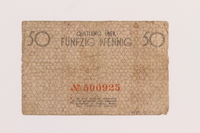
Łódź ghetto scrip, 50 pfennig note, acquired by a Jewish Lithuanian resident
Object
Łódź ghetto scrip, 50 pfennig note, acquired by David Klipp. David was deported to Łódź from Lithuania on January 17, 1940. On August 28, 1944, he was transported to Auschwitz concentration camp in Poland. He was on the same transport as Chaim Rumkowski, the head of the Jewish Council. David was then selected for forced labor and sent to Continental-Gummi-Werke, AG factory, a subcamp of Neuengamme. He worked on the upper floors where rubber was cooked. On November 30, he was sent to Ahlem, another Neuengamme subcamp, to work in an old mine. Ahlem was being evacuated on April 6, 1945, when the prisoners were liberated by British and American soldiers. David relocated to Hannover, Germany on December. 11, 1945. He emigrated to the United States in 1950.
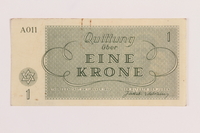
Theresienstadt ghetto-labor camp scrip, 1 krone note, acquired by a Jewish Lithuanian survivor
Object
Scrip, valued at 1 krone, issued in the Theresienstadt (Terezin) ghetto-labor camp and acquired by David Klipp. All currency was confiscated from deportees upon entry and replaced with scrip and ration coupons that could be exchanged only in the camp, located in German occupied Czechoslovakia. David was deported on Janaury 17, 1940, to Łódź Ghetto in Poland from Lithuania. On August 28, 1944, he was transported to Auschwitz concentration camp in Poland. He was on the same transport as Chaim Rumkowski, the head of the Jewish Council. David was then selected for forced labor and sent to Continental-Gummi-Werke, AG factory, a subcamp of Neuengamme. He worked on the upper floors where rubber was cooked. On November 30, he was sent to Ahlem, another Neuengamme subcamp, to work in an old mine. Ahlem was being evacuated on April 6, 1945, when the prisoners were liberated by British and American soldiers. David relocated to Hannover, Germany on December. 11, 1945. He emigrated to the United States in 1950.
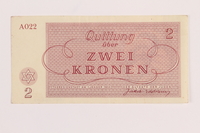
Theresienstadt ghetto-labor camp scrip, 2 kronen note, acquired by a Jewish Lithuanian survivor
Object
Scrip, valued at 2 kronen, issued in the Theresienstadt (Terezin) ghetto-labor camp and acquired by David Klipp. All currency was confiscated from deportees upon entry and replaced with scrip and ration coupons that could be exchanged only in the camp, located in German occupied Czechoslovakia. David was deported on Janaury 17, 1940, to Łódź Ghetto in Poland from Lithuania. On August 28, 1944, he was transported to Auschwitz concentration camp in Poland. He was on the same transport as Chaim Rumkowski, the head of the Jewish Council. David was then selected for forced labor and sent to Continental-Gummi-Werke, AG factory, a subcamp of Neuengamme. He worked on the upper floors where rubber was cooked. On November 30, he was sent to Ahlem, another Neuengamme subcamp, to work in an old mine. Ahlem was being evacuated on April 6, 1945, when the prisoners were liberated by British and American soldiers. David relocated to Hannover, Germany on December. 11, 1945. He emigrated to the United States in 1950.
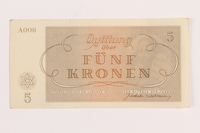
Theresienstadt ghetto-labor camp scrip, 5 kronen note, acquired by a Jewish Lithuanian survivor
Object
Scrip, valued at 5 kronen, issued in the Theresienstadt (Terezin) ghetto-labor camp and acquired by David Klipp. All currency was confiscated from deportees upon entry and replaced with scrip and ration coupons that could be exchanged only in the camp, located in German occupied Czechoslovakia. David was deported on Janaury 17, 1940, to Łódź Ghetto in Poland from Lithuania. On August 28, 1944, he was transported to Auschwitz concentration camp in Poland. He was on the same transport as Chaim Rumkowski, the head of the Jewish Council. David was then selected for forced labor and sent to Continental-Gummi-Werke, AG factory, a subcamp of Neuengamme. He worked on the upper floors where rubber was cooked. On November 30, he was sent to Ahlem, another Neuengamme subcamp, to work in an old mine. Ahlem was being evacuated on April 6, 1945, when the prisoners were liberated by British and American soldiers. David relocated to Hannover, Germany on December. 11, 1945. He emigrated to the United States in 1950.
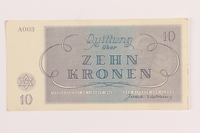
Theresienstadt ghetto-labor camp scrip, 10 kronen note, acquired by a Jewish Lithuanian survivor
Object
Scrip, valued at 10 kronen, issued in the Theresienstadt (Terezin) ghetto-labor camp and acquired by David Klipp. All currency was confiscated from deportees upon entry and replaced with scrip and ration coupons that could be exchanged only in the camp, located in German occupied Czechoslovakia. David was deported on Janaury 17, 1940, to Łódź Ghetto in Poland from Lithuania. On August 28, 1944, he was transported to Auschwitz concentration camp in Poland. He was on the same transport as Chaim Rumkowski, the head of the Jewish Council. David was then selected for forced labor and sent to Continental-Gummi-Werke, AG factory, a subcamp of Neuengamme. He worked on the upper floors where rubber was cooked. On November 30, he was sent to Ahlem, another Neuengamme subcamp, to work in an old mine. Ahlem was being evacuated on April 6, 1945, when the prisoners were liberated by British and American soldiers. David relocated to Hannover, Germany on December. 11, 1945. He emigrated to the United States in 1950.

Theresienstadt ghetto-labor camp scrip, 20 kronen note, acquired by a Jewish Lithuanian survivor
Object
Scrip, valued at 20 kronen, issued in the Theresienstadt (Terezin) ghetto-labor camp and acquired by David Klipp. All currency was confiscated from deportees upon entry and replaced with scrip and ration coupons that could be exchanged only in the camp, located in German occupied Czechoslovakia. David was deported on Janaury 17, 1940, to Łódź Ghetto in Poland from Lithuania. On August 28, 1944, he was transported to Auschwitz concentration camp in Poland. He was on the same transport as Chaim Rumkowski, the head of the Jewish Council. David was then selected for forced labor and sent to Continental-Gummi-Werke, AG factory, a subcamp of Neuengamme. He worked on the upper floors where rubber was cooked. On November 30, he was sent to Ahlem, another Neuengamme subcamp, to work in an old mine. Ahlem was being evacuated on April 6, 1945, when the prisoners were liberated by British and American soldiers. David relocated to Hannover, Germany on December. 11, 1945. He emigrated to the United States in 1950.
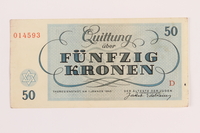
Theresienstadt ghetto-labor camp scrip, 50 kronen note, acquired by a Jewish Lithuanian survivor
Object
Scrip, valued at 50 kronen, issued in the Theresienstadt (Terezin) ghetto-labor camp and acquired by David Klipp. All currency was confiscated from deportees upon entry and replaced with scrip and ration coupons that could be exchanged only in the camp, located in German occupied Czechoslovakia. David was deported on Janaury 17, 1940, to Łódź Ghetto in Poland from Lithuania. On August 28, 1944, he was transported to Auschwitz concentration camp in Poland. He was on the same transport as Chaim Rumkowski, the head of the Jewish Council. David was then selected for forced labor and sent to Continental-Gummi-Werke, AG factory, a subcamp of Neuengamme. He worked on the upper floors where rubber was cooked. On November 30, he was sent to Ahlem, another Neuengamme subcamp, to work in an old mine. Ahlem was being evacuated on April 6, 1945, when the prisoners were liberated by British and American soldiers. David relocated to Hannover, Germany on December. 11, 1945. He emigrated to the United States in 1950.



